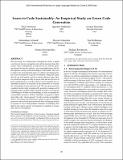Learn to Code Sustainably: An Empirical Study on Green Code Generation
Author(s)
Vartziotis, Tina; Dellatolas, Ippolyti; Dasoulas, George; Schmidt, Maximilian; Schneider, Florian; Hoffmann, Tim; Kotsopoulos, Sotirios; Keckeisen, Michael; ... Show more Show less
Download3643795.3648394.pdf (1.644Mb)
Publisher Policy
Publisher Policy
Article is made available in accordance with the publisher's policy and may be subject to US copyright law. Please refer to the publisher's site for terms of use.
Terms of use
Metadata
Show full item recordAbstract
The increasing use of information technology has led to a significant share of energy consumption and carbon emissions from data centers. These contributions are expected to rise with the growing demand for big data analytics, increasing digitization, and the development of large artificial intelligence (AI) models. The need to address the environmental impact of software development has led to increased interest in green (sustainable) coding and claims that the use of AI models can lead to energy efficiency gains. Here, we provide an empirical study on green code and an overview of green coding practices, as well as metrics used to quantify the sustainability awareness of AI models. In this framework, we evaluate the sustainability of auto-generated code. The auto-generated code considered in this study is produced by generative commercial AI language models, GitHub Copilot, OpenAI ChatGPT-3, and Amazon CodeWhisperer. Within our methodology, in order to quantify the sustainability awareness of these AI models, we propose a definition of the code's "green capacity", based on certain sustainability metrics. We compare the performance and green capacity of human-generated code and code generated by the three AI language models in response to easy-to-hard problem statements. Our findings shed light on the current capacity of AI models to contribute to sustainable software development.
Description
LLM4Code ’24, April 20, 2024, Lisbon, Portugal
Date issued
2024-04-20Department
Massachusetts Institute of Technology. Department of Mechanical EngineeringPublisher
ACM
Citation
Vartziotis, Tina, Dellatolas, Ippolyti, Dasoulas, George, Schmidt, Maximilian, Schneider, Florian et al. 2024. "Learn to Code Sustainably: An Empirical Study on Green Code Generation."
Version: Final published version
ISBN
979-8-4007-0579-3